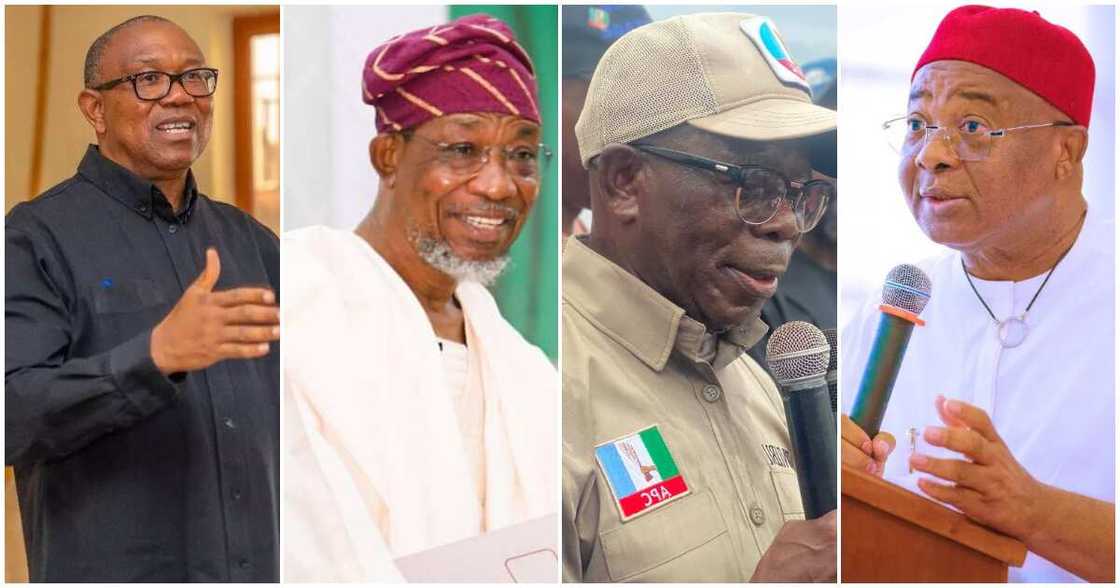List of States Where Tribunal Judgements Have Altered Their Governorship Elections Calendar
The outcomes of election petition tribunals after the 2003 general elections have forced eight states to run a different governorship election calendar.
PAY ATTENTION: Сheck out news that is picked exactly for YOU ➡️ click on “Recommended for you” and enjoy!
Prior to the emergence of Peter Obi as governor of Anambra state through a court of appeal judgement in 2006, all the 36 states in the country used to hold their governorship election on the same day.

Source: Facebook
Legit.ng compiles a list of eight states where their governorship election calendar has been altered as a result of court verdicts.
1. Osun state
As reported by PM News, the appeal court sitting in Ibadan, Oyo state, in November 2010, sacked Olagunsoye Oyinlola, as Osun state governor and declared Rauf Aregbesola of the Action Congress of Nigeria (ACN) winner of the 2007 governorship election in the state.
PAY ATTENTION: Follow us on Instagram - get the most important news directly in your favourite app!
In a unanimous judgement, the five-member appeal panel led by Justice Clara Ogunbiyi declared Aregbesola the winner and ordered that he should be sworn in immediately.
2. Ondo state
According to SaharaReporters, in August 2008, the Ondo state elections petitions tribunal ordered that Labour Party governorship candidate, Olusegun Mimiko, should be sworn in immediately as the state governor because he won the valid votes in 12 out of the 18 local governments.
The five-man tribunal, led by Garba Nabaruma, gave the judgement after it nullified the election that produced Governor Olusegun Agagu.
Agagu appealed the verdict, and in February 2009, the appeal court in Benin City, Edo state, upheld the ruling of the electoral tribunal, stating that Agagu did not win the April 2007 governorship election.
3. Edo state
The chairman of the Edo state governorship petition tribunal, Justice Peter Umeadi, in Benin City, in March 2008, ruled that Adams Oshiomhole of the Action Congress (AC) had proved his allegations of fraud, voter intimidation, multiple voter registration, over-voting and election violence.
The tribunal, therefore, held that the results were adversely affected and declared Oshiomhole governor of Edo State.
The appeal court in November 2008 upheld the judgment of the state elections tribunal that annulled Oserheimen Osunbor of the Peoples Democratic Party (PDP)’s victory.
The Court ruled that Osunbor did not get the most votes in the April 2007 vote and was unlawfully elected in a flawed and chaotic election.
Justice Umaru Abdullahi, president of the court said:
“It is clear that the appeal lacks merit and is hereby dismissed ... Oshiomhole is hereby declared the lawfully elected governor.”
4. Imo state
Residents of Imo state got a happy new year judgement from the supreme court in January 2020, when a seven-man panel led by Justice Kudirat Kekere-Ekun, declared Hope Uzodimma of the Peter as winner of the gubernatorial election.
As reported by TheCable, the apex court sacked Emeka Ihedioha as governor of Imo state, stating that the PDP candidate did not win majority of votes cast in the 2019 election.
“The votes due to the appellant, Hope Uzodinma and the All Progressives Congress (APC) from 388 polling units were wrongly excluded from scores ascribed to them,” she held.
“It is hereby ordered that Emeka Ihedioha, was not duly elected by majority of lawful votes cast at the said election. His return as the elected governor of Imo state is hereby declared null and void and accordingly set aside."
5. Ekiti state
Segun Oni was sacked by the appeal court sitting in Ilorin, Kwara state, in October 2010 and ordered that the Action Congress candidate, Kayode Fayemi, be sworn in in his place.
President of the court, Justice Ayo Salami, leading other four judges, said Fayemi defeated Oni by 10,965 majority votes, contrary to earlier verdict by INEC and the lower court, PM News reports.
The judge added the court voided the votes recorded for Oni in Ijero and Ido-Osi local council areas, for not complying with the electoral act.
The court ordered INEC to withdraw the certificate of return earlier given to Oni and issue a new one proclaiming Fayemi the lawfully elected governor.
6. Bayelsa state
The appeal court sitting in Port Harcourt, Rivers state, in April 2008, ruled that there was no election in Bayelsa state and ordered a fresh election.
The court made the pronouncement after Ebitimi Amgbare of the Action Congress of Nigeria (ACN) approached the court to challenge the victory of Timipre Sylva of the Peoples Democratic Party (PDP)
Sylva, however, won the fresh election and was returned elected as governor of Bayelsa state.
7. Anambra state
Peter Obi of the All Progressive Grand Alliance party (APGA) was the first to get a positive verdict from the tribunal when the Court of Appeal sitting in Enugu, in March 2006, removed Chris Ngige as governor of Anambra state.
The court declared Peter Obi the winner. The court upheld the ruling of the Anambra State Election Petition Tribunal.
8. Kogi state
The Kogi State Election Petitions Tribunal nullified the April 2007 gubernatorial election after the All Nigeria Peoples Party (ANPP) candidate, Prince Abubakar Audu, accused INEC of wrongly excluding him from taking part in the election.
As reported by SaharaReporters, Ibrahim Idris of the PDP appealed the tribunal judgement, but the Court of Appeal reaffirmed the election petition tribunal's verdict.
On February 6, 2008, a court of appeal nullified the April 14, 2007 election and ordered that a fresh election be conducted.
Idris won the fresh election on March 29, 2008, and was returned as the governor of Kogi state.
It will continue until the constitution is amended
An Abuja-based lawyer, Chinedu Onuoha, said the pattern would continue until the constitution is amended.
Onuoha argued that the constitution already envisage these situations when it stipulates in section 285 (6) that the tribunal is bound to deliver its judgement in writing within 180 days from the date of the filing of the petition, which means that the declared winner would have been sworn in before the expiration of the 180 days.
He said:
"If we don't alter the constitution, there's nothing we can do about it. It will continue like this because of the 180 days stipulated by the constitution.
"It means the constitution already envisage a situation when someone will be sworn in when the matter is still in court.
"The process of even changing the constitution is cumbersome. It's a complex produce to change the constitution."
INEC releases final list of governorship candidates for Kogi, Bayelsa, Imo elections
The Independent National Electoral Commissioner (INEC) on Tuesday, June 6, released the final list of candidates for the November 11 governorship elections in Kogi, Bayelsa, and Imo states.
INEC national commissioner and chairman of the Information and Voter Education Committee, Festus Okoye, made this known in a statement released on Tuesday.
Source: Legit.ng


